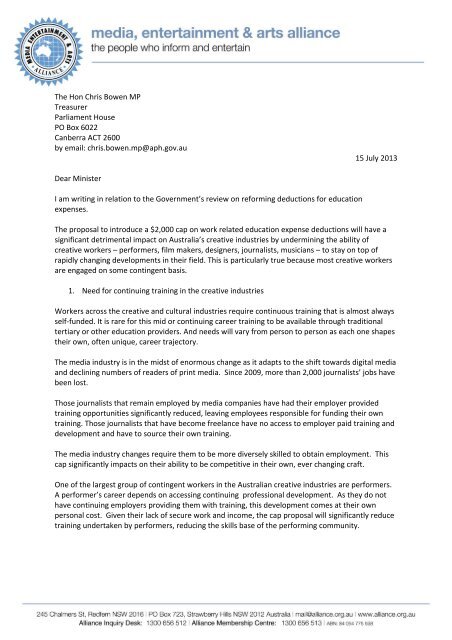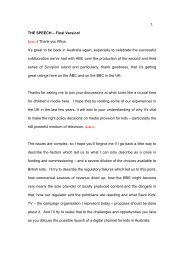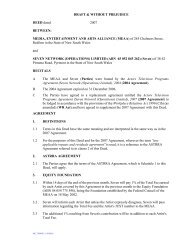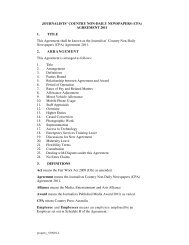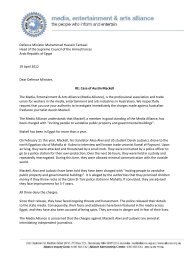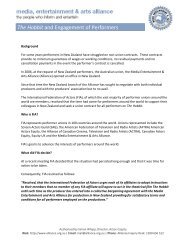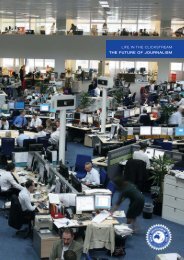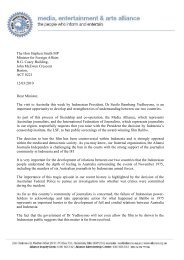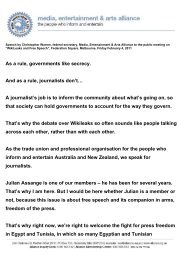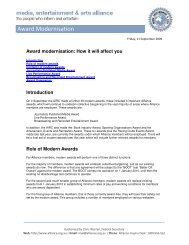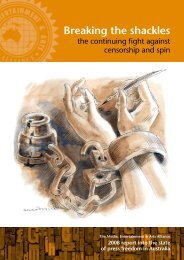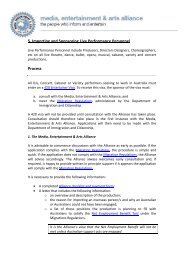The Hon Chris Bowen MP Treasurer Parliament House PO Box ...
The Hon Chris Bowen MP Treasurer Parliament House PO Box ...
The Hon Chris Bowen MP Treasurer Parliament House PO Box ...
You also want an ePaper? Increase the reach of your titles
YUMPU automatically turns print PDFs into web optimized ePapers that Google loves.
<strong>The</strong> <strong>Hon</strong> <strong>Chris</strong> <strong>Bowen</strong> <strong>MP</strong><strong>Treasurer</strong><strong>Parliament</strong> <strong>House</strong><strong>PO</strong> <strong>Box</strong> 6022Canberra ACT 2600by email: chris.bowen.mp@aph.gov.au15 July 2013Dear MinisterI am writing in relation to the Government’s review on reforming deductions for educationexpenses.<strong>The</strong> proposal to introduce a $2,000 cap on work related education expense deductions will have asignificant detrimental impact on Australia’s creative industries by undermining the ability ofcreative workers – performers, film makers, designers, journalists, musicians – to stay on top ofrapidly changing developments in their field. This is particularly true because most creative workersare engaged on some contingent basis.1. Need for continuing training in the creative industriesWorkers across the creative and cultural industries require continuous training that is almost alwaysself‐funded. It is rare for this mid or continuing career training to be available through traditionaltertiary or other education providers. And needs will vary from person to person as each one shapestheir own, often unique, career trajectory.<strong>The</strong> media industry is in the midst of enormous change as it adapts to the shift towards digital mediaand declining numbers of readers of print media. Since 2009, more than 2,000 journalists’ jobs havebeen lost.Those journalists that remain employed by media companies have had their employer providedtraining opportunities significantly reduced, leaving employees responsible for funding their owntraining. Those journalists that have become freelance have no access to employer paid training anddevelopment and have to source their own training.<strong>The</strong> media industry changes require them to be more diversely skilled to obtain employment. Thiscap significantly impacts on their ability to be competitive in their own, ever changing craft.One of the largest group of contingent workers in the Australian creative industries are performers.A performer’s career depends on accessing continuing professional development. As they do nothave continuing employers providing them with training, this development comes at their ownpersonal cost. Given their lack of secure work and income, the cap proposal will significantly reducetraining undertaken by performers, reducing the skills base of the performing community.
2. Travel and education<strong>The</strong> lack of opportunities for career professional training means many of creative workers have totravel to seek out development opportunities through travel and ongoing training to stay relevantand up to date with their skill diversity. This applies across the industries and particularly impacts oncreative workers who live outside Sydney and Melbourne.For example, professional development for orchestra musicians is closely linked to study tripsabroad, and travel to acquire instruments. This cap would reduce a musician’s ability to learn newcreative skills and improve their instruments.<strong>The</strong> need to travel ‐ particularly the need to travel overseas ‐ means the proposed cap woulddramatically increase the cost of professional development and would make much of it unviable forwhat are often low or, at best, mid‐income workers.3. Contingent work<strong>The</strong> approach in the discussion released around this issue reflects a profound misunderstanding ofhow the creative industries work. In the creative industries, continuing employment with a stableemployer is the exception not the rule.Tax policy for training opportunities for creative professionals needs to understand that most will beeffectively self‐employed with both over‐lapping and sequential engagements as contractors,casuals or fixed term employees.<strong>The</strong> current system is adaptable to the needs of the creative industries and the way in which theywork.We fear that the proposed cap will have a serious and deleterious impact on Australia’s ability toproduce world class creative professionals and undermine their demonstrated commitment to buildthriving creative industries on the back of the skills they willingly embrace..So serious is this issue for our members, we would like to take this opportunity to request a meetingwith you to discuss our concerns in more detail. In the meantime, we would strongly urge you tosuspend this proposal and instruct your department to properly look at how best to createincentives to promote professional development, rather than erecting road blocks.With best wishes<strong>Chris</strong>topher WarrenFederal Secretary


